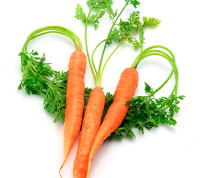

Like all veg, an 80g serving of carrots – that’s equivalent to about ½ a medium-sized carrot or 3 heaped tablespoons – counts as one of your 5-A-DAY.
Carrots are packed with fibre, which helps to keep the digestive system healthy and helps to balance your blood glucose (sugar) levels. Fibre also helps you to feel fuller for longer so that you find it easier to maintain your weight. An 80g serving of cooked carrots contains more than 2g fibre – more than a tenth of the recommended daily amount for adults.
Carrots are packed with a nutrient called beta-carotene, which is converted into vitamin A in the body. Of all fruit and vegetables, carrots are actually the best source of beta-carotene. No surprise then that an 80g serving of cooked carrots contains more than twice the recommended daily amount (RDA) of vitamin A equivalent needed by adults. This is good news as many children and adults have poor intakes of this nutrient. The National Diet and Nutrition Survey of Young People reveals that 13 per cent of 11-14 year old boys and 20 per cent of 11-14 year old girls have vitamin A intakes below the minimum amount needed for good health.(1) This is worrying as vitamin A aids the growth of healthy bones and teeth. Meanwhile, 16 per cent of men and 19 per cent of women aged between 19 and 24 years have extremely low intakes of vitamin A, too.(2)
boys and 20 per cent of 11-14 year old girls have vitamin A intakes below the minimum amount needed for good health.(1) This is worrying as vitamin A aids the growth of healthy bones and teeth. Meanwhile, 16 per cent of men and 19 per cent of women aged between 19 and 24 years have extremely low intakes of vitamin A, too.(2)
Carrots really can help you see in the dark. Beta-carotene, found in large amounts in carrots is converted into vitamin A in the body and this vitamin is vital for healthy vision. Vitamin A works its eye health magic by being transformed into a purple pigment called rhodopsin in the retina, and this pigment is essential for vision in dim light.
Carrots are great for healthy, younger looking skin. Beta-carotene – naturally found in abundance in carrots – is an important antioxidant nutrient. This is great news for our skin as the antioxidant action of beta-carotene may help to act against age-accelerating free radicals, so that our skin remains healthy and elastic.
Carrots are packed with the vibrant orange pigment beta-carotene, which is a supernutrient. German scientists believe that this collects under our skin to give us an internal “sun protection factor” (SPF) of about 4, helping to protect our skin from sun damage all year round and excessive ultra-violet (UV) radiation. That’s not to say you should ditch your sunscreen if you eat a lot of carrots! You should still follow sun safety advice and cover up during the hottest part of the day, wear a hat and regularly slather on sun screen with a high SPF.
Vitamin A is essential for the proper functioning of the immune system. This nutrient keeps the skin and cells that line the airways, digestive tract and urinary tract healthy, so they act as barriers and form the body’s first line of defense against infection.
After years of being told to skip the mayo on salads, it might come as a surprise to learn that a drizzle of French dressing is the perfect accompaniment to salad, benefiting both taste and health. Research from Ohio State University in America found that more carotenoids such as beta-carotene were absorbed when a fresh salad consisting of carrots, romaine lettuce, spinach and cherry tomatoes was eaten with full-fat salad dressing compared with fat-free salad dressing.(3)
If your kids will only eat mashed carrot, don’t worry – it’s a nutritional bonus! Research published in the European Journal of Nutrition showed that more beta-carotene was absorbed from cooked, puréed carrots than from raw ones.(4)
1. National Diet and Nutrition Survey: Young People Aged 4-18 Years. 2000.
2. The National Diet and Nutrition Survey: Adults Aged 19 to 64 Years. Volume 2, 2003.
3. The American Journal of Clinical Nutrition, Volume 80, No 2, 2004.
4. European Journal of Nutrition, Volume 42, Number 6, 2003.
Nutrition information is based on McCance and Widdowson, The Composition of Foods, 6th Edition. Values are for ‘old carrots, boiled in unsalted water’